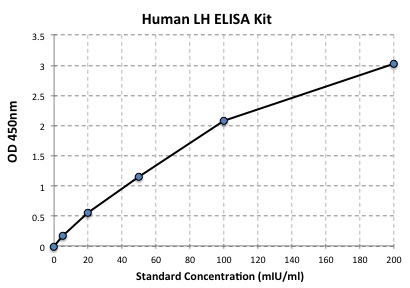More info
Luteinizing hormone (LH, also known as lutropin and sometimes lutrophin) is a hormone produced by gonadotroph cells in the anterior pituitary gland. In females, an acute rise of LH ("LH surge") triggers ovulation and development of the corpus luteum. In males, where LH had also been called interstitial cell-stimulating hormone (ICSH), it stimulates Leydig cell production of testosterone. It acts synergistically with FSH. In both males and females, LH is essential for reproduction. LH levels are normally low during childhood and, in women, high after menopause. As LH is secreted as pulses, it is necessary to follow its concentration over a sufficient period of time to get proper information about its blood level. LH is measured in International Units (IU). For Human Urinary LH, one IU is defined as the amount of LH that has an activity corresponding to 0.13 mg of pure Human Urinary LH.


